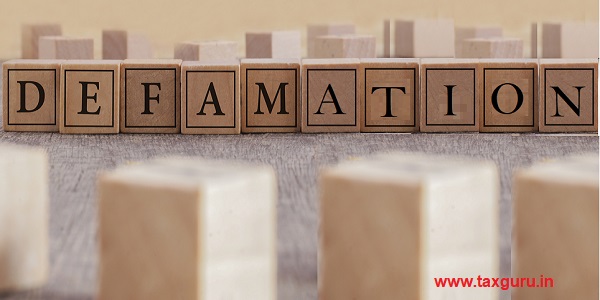Introduction
If the material information about the corporation is published, resulting in negatively affecting its position in the business in which it operates, it is said to be defamed. The statements that would affect the public’s opinion about the company’s financial position are by and large thought to defame the company’s business repute. In order for a corporation to file a defamation action, the essential components are as follows:
- The defendant published the statement, which means it was oral or passed on to somewhere around to any other individual rather than the plaintiff;
- The statement gives adequate details to recognise the plaintiff;
- The statement somehow damaged the reputation of the plaintiff in some way, which is the business reputation of the corporation in the instant case.

Potential Effects of Defamation on Corporations
Commercial defamation poses an enormous risk to corporations. This can damage the reputation, which adversely impacts share prices, client credibility, and access to debt markets. Having established a basic understanding of what defamation is, the article explores the impacts of defamation on a corporation. Taking a financial standpoint, Redlich (1995) describes the potentially devastating impact defamation has on a publicly held company:[i]
Of particular importance to a publicly held corporation is a defamation’s impact upon financial markets. Defamation may lead to a dramatic drop in the market value of a company’s stock. Moreover, since corporate transactions are often directly dependent on stock values, the consequential impact of drop-in share values can be enormous.[ii]
One of the instances is of Shenzhen Fountain v. Caijing Magazine, wherein Caijing Magazine does not agree with the findings of Karpoff et al. (2008) that a negative reputation diminishes stock price. Shenzhen Fountain’s stock price increased by 16% until the end of the month (Chen, 2002, May 27), despite major allegations from a reputable newspaper. A possible explanation is that Karpoff et al. only use data from enforcement actions initiated by the American government agencies: Department of Justice (DOJ) and United States Security and Exchange Commission (SEC). Thus, they offer a geographically focused conclusion, which may not be transferable to jurisdictions outside of the US.
Another instance wherein a claim was brought by Trizec Properties Inc. and Trizec Canada Inc. against a senior research analyst with Citigroup Global, the Superior court of Ontario in Citigroup’s Downgrade Trizec’s Lawsuit[iii] denied the claim raised by Trizec Properties Inc. and Trizec Canada Inc. against a senior research analyst with Citigroup Global. The claim alleged that the advisor based on faulty research made misleading oral and written comments about Trizec. It was alleged that Trizec’s board was uncontrollable as claimed by the Citigroup advisor. Trizec filed a suit seeking damages. The claim was framed on the grounds of defamation, false representation (negligence), and as a violation of the deceptive advertising provisions of the Competition Act. A motion was brought by Citigroup to strike every one of the claims with the exception of the defamation claim. It was clear that the main reason for striking the negligence and competition claims was evident: due to numerous legal defences (such as the defence of public interest), it is easier for the defendant to defend a defamation claim In claims of negligence and violation of the Competition Act, these defences are not available.
Defamation is a crime in India. It is recognised under Section 499 of the Indian Penal Code, 1860 (“IPC”)[iv]. In criminal law, the gravity of the offence of defamation under criminal law is much more serious than in common law. Criminal law requires that the statement must have a clear intention to arouse the hostility of another person to be considered defamatory. Therefore, in the offence of defamation under IPC, it is significant to have express intent behind an action.
In Union Benefit Guarantee Company v. Thakorlal Thakor[v], it was held that words used in a way to negatively reflect upon a company in relation to its operations and transactions, with the intent to cause injury to the company, are actionable without evidence of special damage. In the event that the defamatory statement alludes to the prestige of its officers, special damage must be proved.
The Supreme Court in Iridium India Telecom v. Motorola (2011)[vi] had unconditionally held that the corporations cannot be excluded from criminal prosecution on the basis that they do not have the intention i.e. mens rea for committing the criminal offences. According to the attribution principle, the intention of committing the crime by the corporation’s members i.e. the people who are accountable for the issues and undertakings of the organisation and at the helm of its affairs would be attributed to the organisation.
Instances of analysts
The backside of the right to sue for defamation is the chilling effect on free speech and expression. In the legal context, the term ‘chilling effect’ refers to a situation where a speech or conduct that interests an individual or group is suppressed primarily out of fear of punishment. It is the hindrance of the legitimate exercise of natural and legal rights by the risk of lawful sanction. It is easy to censure instead of really getting into the profundities of the issue. Naturally, healthy criticism encourages creativity and growth. These days, it is not difficult to have a critical approach as opposed to really get into the skin of the matter.
The right to fair criticism is an essential part of free speech. A statement based on analysis of factual information will not be considered defamatory. The primary defence against defamation allegations is truth or bona fide fair criticism. Defamation issues only arise when the statements are false and maliciously intended.
In the case of financial analysts, they specialize in analyzing and identifying business problems. In Indiabulls Real Estate Ltd v. Veritas Investment Research Corporation and Others[vii], Veritas Investments, a Canadian organization situated in Ontario filed a settlement suit of guarantee against Indiabulls asserting damages of $11 million (Rs 70 crore) for the claimed defamatory declarations and press releases publicized by Indiabulls, which incited the closure of its India Research services. The Delhi High Court granted an interim order in favour of Indiabulls.
This raises the question of whether financial analysts should be protected from the offence of defamation, on the grounds that it affects free speech, as well as impedes them from discharging their duties fairly and in a balanced manner. It is true that corporate reputation is built over time and is easily tarnished, which puts a great measure of responsibility on an analyst to ensure the authenticity, verification, and accurate assessment of sources. It is also true that if every analyst who says anything against them or their practices is slapped with defamation charges by corporations, it will deter analysts from being proactive in their work. However, if a financial analyst publishes a false report, it will not be justified to provide blanket immunity from defamation charges in such an event. Therefore, each case must be analyzed to strike a balance between reputation and freedom of speech in the face of public interest and corporate reputation.
Conclusion
The courts have seen that as the corporations have eminence and status in the corporate environment, defamation of such corporations is triable. A corporation business relies upon its great brand name to draw in clients and to accomplish the objectives for which it was established. Hence, any false publications of information that would be likely to dispel the clients or tarnish the image of the corporation have been held to be actionable.
This article is written by Aayush Akar, Student, National Law University Odisha & Aashita Khandelwal, Student, Jagran Lakecity University, Bhopal.
*****
[i] Jandre Jansen van Rensburg, The Risks of Defamation: An Analysis into the Driving Factors Determining the Outcome of Commercial Defamation Cases, June 2019.
[ii] (Redlich, 1995, p. 1169).
[iii]Bennet Jones, https://www.bennettjones.com/Publications-Section/Updates/Open-Season-on-Analysts (last visited July 26th, 2021).
[iv] Indian Penal Code, 1860, Acts of Parliament, 1860 (India) – “Whoever, by words either spoken or intended to be read, or by signs or by visible representations, makes or publishes any imputation concerning any person intending to harm, or knowing or having reason to believe that such imputation will harm, the reputation of such person, is said, except in the cases hereinafter expected, to defame that person.”
[v] Union Benefit Guarantee Company v. Thakorlal Thakor, (1935) 37 Bom LR 1033.
[vi] Iridium India Telecom v. Motorola, 2010 SCC Online SC 1185.
[vii] Indiabulls Real Estate Ltd. v. Veritas Investment Research Corporation, 2019 SCC OnLine Del 8294.





